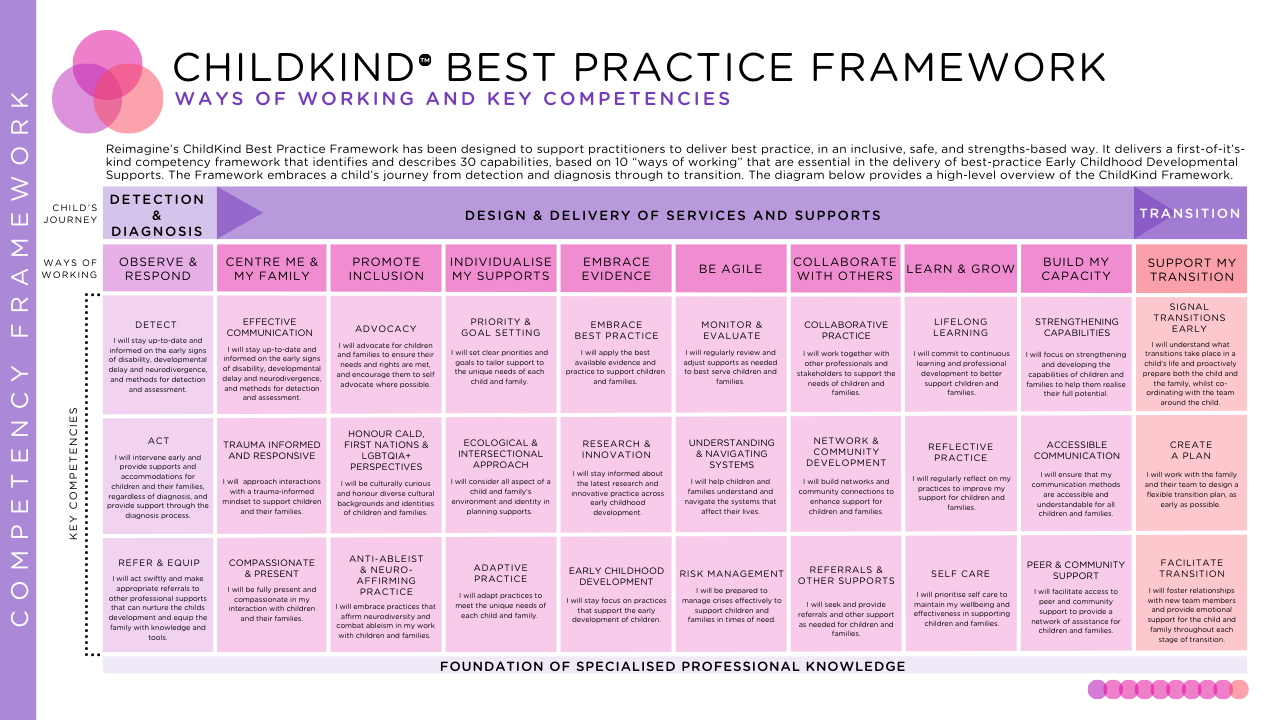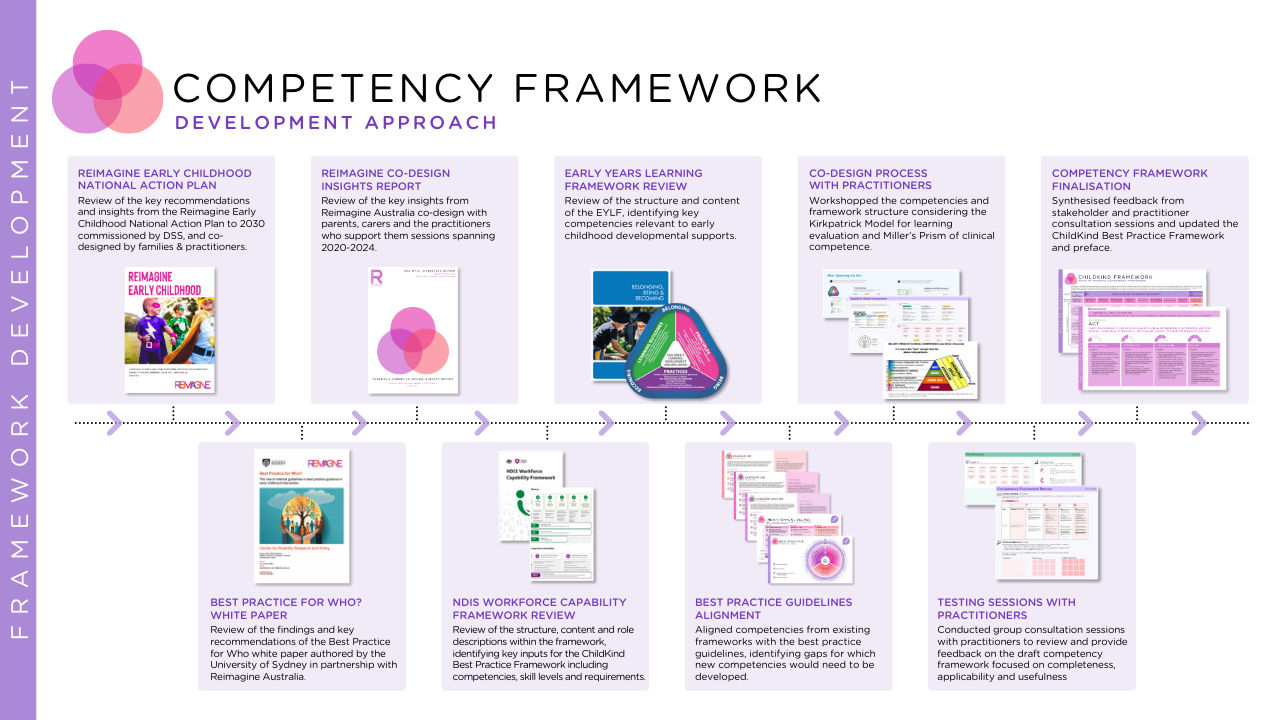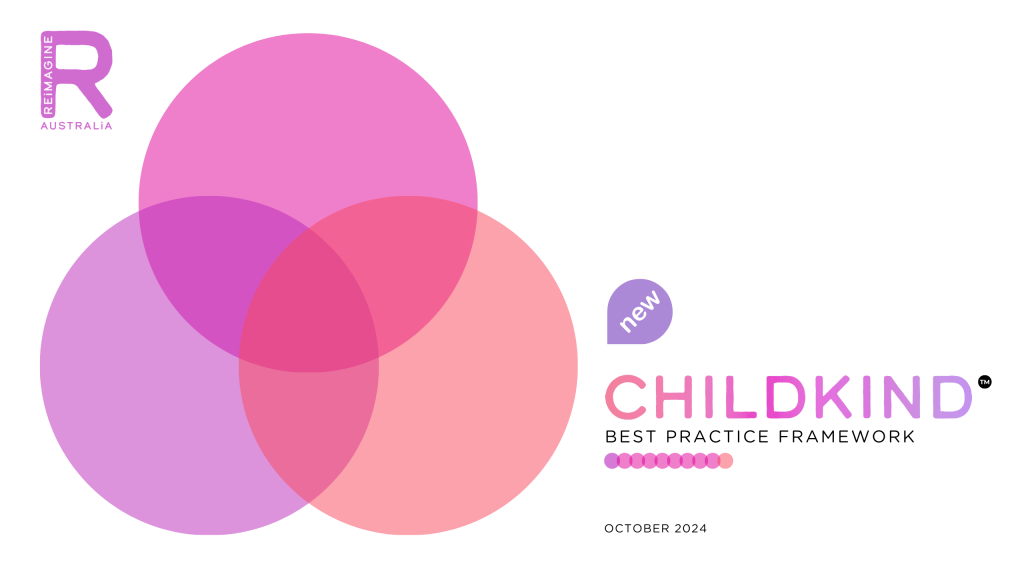In a world where services can oftentimes feel fragmented or disjointed, the ChildKind framework unifies best practices across sectors, ensuring that no matter where families of children with disability, developmental delay and neurodivergence turn for support, they will find a common commitment to excellence. Designed to empower you as a practitioner, it offers you clarity, direction, and confidence in your work, whilst enabling the best possible outcomes for children and their families.
The ChildKind Best Practice Framework is an innovative tool developed to ensure that young children with disability, developmental delay, and neurodivergence, and their families, receive the best possible care and support. The framework ultimately aims to improve outcomes for children via a core focus on equipping the many practitioners working across diverse service systems with the practical knowledge and skills required to deliver consistent, holistic, and evidence-based support. This includes professionals in healthcare, early childhood education, disability, social services, and community organisations, all of whom contribute tangibly to a child’s early development journey.

The ChildKind Best Practice Framework is the first-of-its-kind, establishing a truly inclusive early childhood development framework that universally supports all developing children. At the heart of this work is how best to support children with disability, developmental delay, and neurodivergence, and their families ensuring they are fully integrated rather than treated as though they are separate, or other, or as an afterthought. Unlike traditional frameworks that create distinct pathways for neuro-typical and neurodivergent children, ChildKind embraces a unified approach, recognising that all children, regardless of their abilities or differences, deserve the same opportunities for growth, development, and inclusion. Our groundbreaking new framework intentionally embodies the principle that every child should be valued and supported to realise their potential, within the same inclusive approach.
How ChildKind aligns with other key frameworks and approaches:
We will all profit from a more diverse, inclusive society, understanding, accommodating, even celebrating our differences, while pulling together for the common good.” –Ruth Bader Ginsburg
–Ruth Bader Ginsburg
The ChildKind Best Practice Framework is built on the bedrock of the updated guidance on best practice, foundational to which is the 2024 National Guidelines for Best Practice in Early Childhood Intervention (2nd Edition).
The framework breathes to life the three new pillars from the Best Practice Guidelines (2nd Edition) – Understand Me, Support Me, and Enable Me – through 10 Ways of Working, 30 Key Competencies, and 8 Values and Behaviours. This body of work is the result of extensive co-design efforts spanning many years, involving families of young children with disability, developmental delay, and neurodivergence, and the practitioners who support them.
Each element of ChildKind is designed to ensure that all practitioners are equipped to understand and meet the unique needs of each child and family via a consistent, actionable approach for practitioners across sectors, underpinned by respect, inclusion, and a commitment to supporting each child’s full potential.
ChildKind integrates these principles, ensuring that the knowledge, skills, and behaviours outlined in the framework are at the core of every practitioner’s approach.

The 2024 updated guidance has been informed by our exhaustive body of work since the publication of the first edition of the National Guidelines in 2016 and the publication of the 2018 Best Practice Report (commissioned by the NDIA). The foundations for change in the updated guidelines, and the cornerstones for the ChildKind framework were laid during the extensive consultation we undertook to deliver the Reimagine Early Childhood National Action Plan to 2030, as commissioned by the Australian Government in 2018.
Further insights were gathered during the co-design of large national projects, including our Thrivary app (funded by ILC) that were instrumental in shaping the strategic direction of Reimagine’s work in revising the guidance for early childhood developmental supports (intervention) in Australia, setting the stage for the additional guidance and tools that have been delivered.
Every conversation, consultation, workshop, round table, or survey that we have engaged in for almost a decade always came back to one single core topic – best practice. We knew what you had shared with us held the key to something special. So, we meticulously gathered your insights and ideation, and carefully synthesised them into key themes to support the co-design of the draft versions of our updated National Guidelines for Best Practice in Early Childhood Intervention (2nd Edition) and for our ChildKind Best Practice framework.
To finalise the new guidance we engaged in further co-design with a diverse range of participants, including primary caregivers, families, healthcare practitioners, paediatric specialists, educators, and NDIS support workers. The outcomes of this work provided the essential elements for the ChildKind Framework.
To all of those who have shared this journey with us over the past decade, whether in part or in full, we are so grateful to you. Your generosity, and your shared commitment to shape an even better future for children with disability, developmental delay and neurodivergence, and their families, forms the DNA of ChildKind. We hope you see your wisdom reflected within it.
Access more information on the ChildKind Best Practice Framework with its 10 Ways of Working, 30 Key Competencies and 8 supporting Values and Behaviours here:
